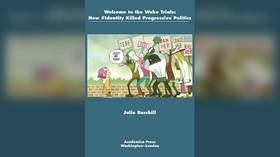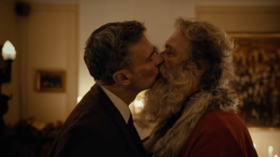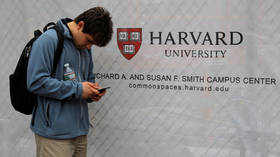‘Trans goons, bedwetters and snowflakes’: New book destroys identity politics

Controversial author Julie Burchill dispenses with the niceties in ‘Welcome to the Woke Trials’, her new book that takes on the activists pushing the gender debate and Generation Bedwetter icons like Sam Smith and Meghan Markle.
There’s an undeniable groundswell building against the crazed identity-obsessed woke mob, but if there’s to be any significant pushback, then there will need to be more people prepared to surge over the trenches like British journalist and social provocateur Julie Burchill.
In her new book, ‘Welcome to the Woke Trials: How #identity Killed Progressive Politics’, Burchill takes the critical theory debate to a whole new level, slicing and dicing arguments over ‘girldicks’ and ‘fauxginas’ with glee, letting no trans goon – or “Troons,” as she dubs them – escape evisceration.
While she lists her hobbies as “luncheon, philanthropy and spite,” it’s largely only the latter that’s served up here as she takes on the modern orthodoxies around gender, sex, climate, race, Islam, porn, politics, class and Brexit. Burchill’s strength is that, as a journalist, she reads the newspapers, is active on social media and pays attention to the dominant features on the media landscape, so she picks targets that resonate with regular folk.
She uses the language of the pub to make her argument, and it’s refreshing to read a woman’s account that invites cis men – like me – into the debate.
Burchill’s at her best when she turns her guns on irritating modern-day narcissists such as pop star Sam Smith, who came out as gay to a bemused ‘so what’ from his audience, and later announced, “I’ve decided I am changing my pronouns to THEY/THEM… I understand there will be many mistakes and misgendering but all I ask is you please, please try.”
She revels in his ignorance – “I hate reading,” Smith has announced – his lockdown meltdown, and the fact that people stopped buying his music when his woke bleating eventually became too much for even his fans, by recollecting, “As my mum would have said as she slapped my legs, ‘Now you’ve got something to cry about!’”
Polite people might tut-tut at this shameless calling-out, but to the rest of us, this is worth the price of the book alone, because most commentators, journalists and nervous nellies in the media are too scared to challenge this rubbish using language we can all understand.
As an old-school feminist, Burchill continually returns to the real bone by her bowl, the trans debate, and boldly dismisses the endless attacks she endures from these “Brave and Stunning Kweens.”
There's no ambiguity about her position. “Be clear, ‘trans rights’ is not a liberation struggle of some oppressed minority,” she writes. “It is a male supremacy movement, made up of wolves in ewes’ clothing, which rose up nursing its painful and unwanted collective erection alongside the incels, so up to their eyes in it that they can’t see the forest for their wood.”
She points out that men who want to be women who want to be men “are not ‘trans’ anything, implying as the word does some sort of journey from being one thing to another.”
“The lunacy that biology can be overcome by ‘feelings’ – that men can become women – is frankly as preposterous as putting a tiny saddle on a seahorse and expecting it to win the Grand National.”
Among the many and varied sources quoted on this particular issue, one of the best is from American thinker Emily Zinos, who said, “The ontological impossibiltiy of becoming the opposite sex is why there’s such a frantic emphasis on passing gender identity laws: the only way to ‘be’ the opposite sex is through legal definition. Outside of words, gender identity simply doesn’t exist.”
It’s all in the language. As is so often the case in the current public conversation, the words of American community activist Saul Alinsky are referenced: “He who controls the language controls the masses.” And while Burchill concedes things seem bad right now, “the masses are notorious for fighting back.”
This book was very nearly never published. Burchill’s first publisher, Hachette, cancelled her contract after her own “drunken stupidity on social media,” while Stirling, who picked her up after that, became embroiled in its own nasty extremism and Burchill dumped them. At the third time of trying, it was picked up by Academica, and it’s a very good thing that it was, too.
If you want a solid, reasoned debate on the ills of modern life and prefer language free of academic pretension and the arcane vocabulary that is employed solely to exclude ordinary folk, then ‘Woke Trials’ is for you. Read it.
The statements, views and opinions expressed in this column are solely those of the author and do not necessarily represent those of RT.

















